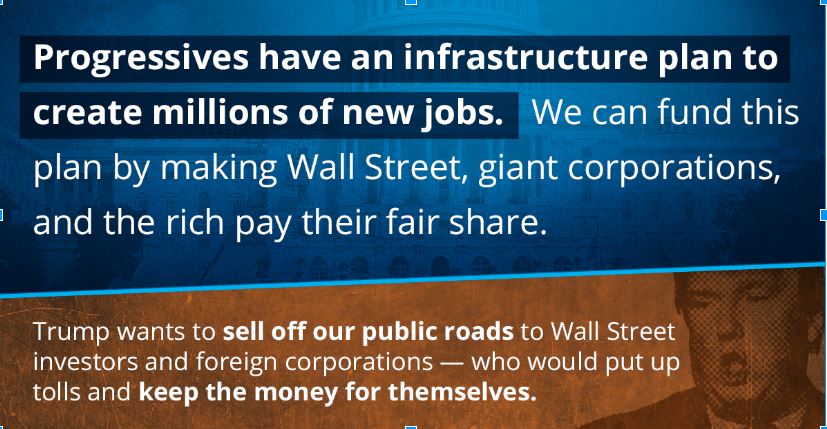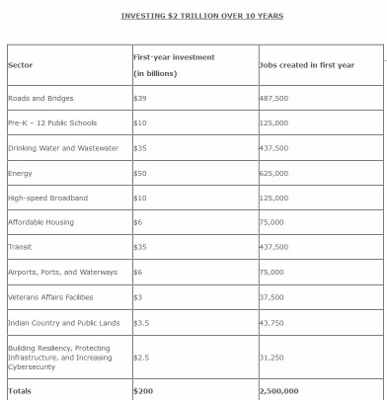A 21st Century New Deal for Jobs - Congressional Progressive Caucus and Allies Unveil Principles for Infrastructure and Bold Proposal to Create Millions of Jobs
https://portside.org/2017-05-25/21st-century-new-deal-jobs-congressional-progressive-caucus-and-allies-unveil-principles

Portside Date:
Author: Congressional Progressive Caucus
Date of source:
Congressional Progressive Caucus

Congressional Progressive Caucus Co-Chairs Rep. Raúl M. Grijalva (D-AZ) and Rep. Mark Pocan (D-WI), Rep. Keith Ellison (D-MN), Rep. Ted Lieu (D-CA), Rep. Barbara Lee (D-CA), Rep. Pramila Jayapal (D-WA), Rep. Jared Huffman (D-CA), Rep. Ro Khanna (D-CA), Rep. Jared Polis (D-CO), Rep. Wm. Lacy Clay (D-MO), Rep. Rick Nolan (D-MN), and Rep. Carol Shea-Porter (D-NH) made the following statements today after they unveiled a House Resolution outlining 10 principles that should be included in any infrastructure plan considered by Congress. They also unveiled the CPC's bold infrastructure proposal, entitled a 21st Century New Deal for Jobs.
"America's infrastructure is desperately in need of repair - this year, the American Society of Civil Engineers estimated $4.6 trillion in infrastructure needs, of which more than $2 trillion did not have estimated funding," said Rep. Lieu. "The American people deserve to have a serious conversation about how to address these needs. To fund infrastructure projects, President Trump's relatively small and incoherent plan would use irresponsible tax gimmicks that benefit Wall Street at the expense of taxpayers. My colleagues and I know that Americans cannot afford to settle for this scam. Instead, we have introduced the 21st Century New Deal for Jobs to ensure that Congress boldly addresses our infrastructure needs and supports a plan that creates millions of jobs without sacrificing protections for workers and the environment."
"Democrats are leading the way for millions of jobs. Donald Trump wants to sell off our roads to foreign governments and give taxpayer dollars to Wall Street billionaires, and he calls that job creation?" Rep. Pocan said. "Maybe that will create jobs in countries like Russia, but not for hard-working Americans. Democrats are determined to take this fight to the people. Our country is in dire need of a bold vision to repair our crumbling roads and bridges, clean our air and water, restore our children's unsafe school buildings, and connect our communities to each other with high-speed rail and internet. While President Trump and the Republicans are busy concocting a trillion-dollar Wall Street giveaway under the guise of infrastructure, Democrats believe big corporations should pay their fair share to support dignified employment and build a more sustainable and vibrant economy for everyone."

"The Congressional Progressive Caucus' 21st Century New Deal for Jobs is the only comprehensive infrastructure plan that places workers before corporate interest," Rep. Grijalva said. "It provides significant investments to address the current needs of our country, such as modernizing our outdated schools and replacing our lead-ridden pipelines that have destroyed the public health of children in Flint. The plan creates millions of forward-thinking jobs and ensures nobody is forced to compromise their living standards or working conditions. It sets fundamental principles of social, racial, and environmental justice so our infrastructure planning workforce reflects the needs of our diverse communities. More importantly, it commits public money for the public good. I am proud to support the 21st Century New Deal for Jobs plan to meet the real economic and infrastructure needs of our country."
"Rebuilding our nation's infrastructure is about so much more than construction projects," Rep. Ellison said. "It's about replacing the pipes in Flint that poisoned an entire community, making our roads and bridges safer, and rebuilding crumbling schools. As Democrats, we believe we must improve the lives of millions of hardworking families, putting millions of Americans to work at good jobs, and make our tax system fairer by making the wealthiest pay their fair share. The Republican infrastructure plan is nothing more than another tax break for millionaires and billionaires."
"We need to invest in our infrastructure so that communities - especially communities of color - are empowered for a 21st century economy," Rep. Lee said. "The CPC infrastructure plan lays out bold, long overdue investments into the American people. Our plan puts people to work rebuilding our crumbling roads and bridges, expanding the green economy, and bringing broadband to communities across the country."
"Donald Trump's cruel budget eliminates billions in funds that invest in our transportation, air quality and safety. In stark contrast to Trump's misguided values, we at the Congressional Progressive Caucus have prioritized infrastructure to ensure success for our communities. The 21st Century New Deal for Jobs plan will modernize and prepare workers for our changing economy," said Rep. Jayapal. "Day in and day out, our children, families and communities rely on safe school buildings, up-to-date transportation, secure roads and bridges and a steady paycheck. By upgrading our infrastructure, creating jobs and training workers for careers in clean energy, water and transportation, this New Deal will help our nation thrive."
"Too many communities, especially in rural America, are being left behind because of crumbling infrastructure," said Rep. Huffman. "We shouldn't be satisfied by the status quo. In my district alone, we ought to be overhauling roads that are literally falling into the ocean, repairing schools closed due to mold infestation, and connecting the communities that are isolated for lack of high quality broadband. The 21st Century New Deal for Jobs plan will ensure that our country has the infrastructure to compete in the global economy, enable children - and all Americans - to thrive, while also taking smart steps to rebuild our communities."
"Expanding vital internet service supports the progressive vision of 21stCentury America," Rep. Khanna said. "The CPC's plan will expand economic opportunity by bringing high-speed Internet access to all Americans -- including new access for rural communities and incentives to increase adoption in low-income communities. By doing so, we will help create millions of new jobs and start-ups in rural America, in tribal areas, and in urban centers that have yet to see the gains of the technology revolution."
"Now is the time for a direct and bold federal investment in jobs and infrastructure, addressing everything from roads and bridges to broadband, public rail, to our crumbling schools, and energy grid," Rep. Polis said. "We need an infrastructure plan that doesn't aim to provide giveaways to special interests, but helps all Americans and creates millions of jobs across our country. In my district we have to address problem-areas that range from I-25 between Denver and Fort Collins, I-70 which has millions of people traveling to and from the mountains, or the North West line commuter rail that is 35 years behind schedule. A wise infrastructure plan will alleviate traffic, invest in our schools, increase energy efficiency, encourage commerce, and create millions of good-paying jobs."
"The principles in this resolution will not only rebuild our crumbling roads, bridges, ports, airports, schools, water systems and other vital infrastructure projects," said Rep. Lacy Clay. "They will also lift up hard-working families in St. Louis and across the nation. The long-overdue investment that we make in public infrastructure will generate millions of good American jobs and it pay huge dividends for many generations to come. I'm proud to cosponsor this important set of principles that will move our nation forward."
"America's infrastructure is the cornerstone of our national security and the key to job creation, business development, comfortable lives and quality communities," Rep. Nolan said. "When we invest in our roads, bridges, airports, waterways, ports, pipelines, rail lines and broadband systems, we invest in ourselves and pay prosperity forward to future generations. So we can't be shortsighted. We need to think big, plan ahead, and make rebuilding our infrastructure the priority it needs to be."
Too much of our infrastructure is in fair or critical condition, even though there are hard-working people across New Hampshire and our nation ready to do the job," Rep. Shea-Porter said. "It's time for Congress to work together on a comprehensive infrastructure plan that follows these basic principles to address our urgent needs, invest in our future, and create good jobs."

Debates over America's infrastructure often focus on productivity, growth, and costs, but can sometimes overlook the human dimension of the crisis. Lead-contaminated drinking water in Michigan; dilapidated public schools in Oklahoma; collapsing bridges in Minnesota; flooded cities in Texas; and inadequate and unaffordable housing in every community -each aspect of America's crumbling infrastructure harms real people and stifles human potential in the world's wealthiest country.
Countless personal stories behind America's deficient infrastructure contribute to a staggering economic and social toll. The scope of the problem ranges from the simple annoyance of bumper-to-bumper traffic, which amounts to billions of lost hours every year, to the tragic effect of air pollution, which causes hundreds of thousands of premature deaths annually and devastates the health of low-income neighborhoods and communities of color.
Government spending on infrastructure as a share of the economy has fallen to a two-decade low, yet for every $1 invested in public-sector infrastructure, our economy would gain $1.70 back through greater employment and efficiency.A vision for infrastructure that invests our resources in people-a plan that produces millions of family-sustaining jobs, raises living standards, reduces inequality, strengthens education, reduces poverty, and cleans our environment-is more urgent than ever. But President Trump and the Republicans are intent on pursuing the exact opposite approach.
The Republican agenda is a sham, hardly investing any new resources into infrastructure while aiming to slash existing federal programs. In reality, President Trump and Congressional Republicans are pushing a trillion-dollar corporate giveaway that would create tax incentives for Wall Street to privatize our roads, bridges, sanitation systems, and utilities, while raising tolls, fees, and bills-all through taxpayer subsidies. Even worse, their approach will leave the infrastructure that we depend on in utter disrepair unless it generates a profit for private investors.
The Congressional Progressive Caucus presents a real alternative, crafted in partnership with the grassroots: a 21st Century New Deal for Jobs, which aims to do no less than transform the foundations of America's economy.
Drawing on the legacy of President Franklin Roosevelt's bold vision and adapting it to a modern context, our 21st Century New Deal for Jobs makes Wall Street, big corporations, and the wealthiest pay their fair share in order to put America back to work. It invests $2 trillion over 10 years, employing 2.5 million Americans in its first year, to rebuild our transportation, water, energy, and information systems, while massively overhauling our country's unsafe and inefficient schools, homes, and public buildings. Yet the New Deal for Jobs' detailed plan to nurture a vibrant, 21st century economy goes much further than rapidly achieving full employment and sustaining it over a decade. It recognizes that plentiful, dignified jobs are not enough. They must be paired with an agenda that empowers women and communities of color while protecting the planet.
Unlike the Republican agenda, a 21st Century New Deal for Jobs puts real money in the pockets of ordinary workers and families. A New Deal for Jobs mandates local hiring in addition to raising the benchmark for locally prevailing wages in each area, increasing infrastructure workers' paychecks. The proposal further cements its commitment to working people by prioritizing the hiring of our veterans and demanding robust Buy America provisions in every federal procurement decision for labor and materials.
The 21st Century New Deal for Jobs combines strong job and wage growth with the fundamental principles of social and racial justice, targeting employment for those who have been systematically shut out of economic growth. This means that job training and local hiring will reflect the racial and gender diversity of the community's workforce and those seeking employment. Federal procurement will prioritize minority- and women-owned businesses, cooperatives and employee-owned firms, and community-owned and municipal enterprises. Recognizing the job-creating power of small businesses, we also aim to increase funds awarded through programs such as Historically Underutilized Business Zones.
Furthermore, the 21st Century New Deal for Jobs gives precedence to the infrastructure needs of people who are struggling the most. Lower-income people and communities of color coping with elevated unemployment-both rural and urban alike-will play a leading role in determining their own infrastructure gaps and solutions. It also calls for local and regional planning that considers equity of access to transportation across communities. The New Deal for Jobs marks a clear contrast with the infrastructure priorities of Republicans, who promote prisons and militarized border fences. Rather, a New Deal for Jobs improves Americans' quality of life by removing toxins like lead and asbestos; revitalizing parks and schools; expanding the supply of safe, decent and affordable housing; ambitiously connecting our entire country through affordable high-speed internet and high-speed rail; cleaning our air and water; and shortening our travels in public transit, cars, and planes.
Finally, the New Deal for Jobs invests the necessary resources into averting catastrophic climate change while generating millions of new jobs and positioning the United States as a global leader in the fast-growing industries and technologies of the future. New smart-grid strategies will revolutionize our outdated electricity transmission system and democratize energy production, promoting clean, carbon-free alternatives. Large-scale public financing for energy-efficiency retrofits in America's buildings will drastically minimize waste while saving families money. Crucially, a New Deal for Jobs prioritizes federally funded employment opportunities within this burgeoning new sector for workers and communities who currently depend on fossil-fuel production.
A program as sweeping and ambitious as the 21st Century New Deal for Jobs must be guided by an ethos of building smart. Our plan integrates high-quality planning, cost controls, and maintenance into all initiatives while allocating additional human and technical resources to manage community and environmental approval processes. A New Deal for Jobs build-smart philosophy also mandates state-of-the-art security measures to protect America's electrical grid, dams, broadband networks, and other vital infrastructure from cyber- and physical attacks.
Americans across the political spectrum are realizing that our country's infrastructure is in desperate need of overhaul. But the contrast between the Republican vision and our 21st Century New Deal for Jobs could not be starker in either size or scope. The Congressional Progressive Caucus forcefully rejects an infrastructure agenda that wastes tens of billions of dollars on useless projects such as a thousands-of-miles-long border wall that threatens human and environmental safety.
The 21st Century New Deal for Jobs lays out, in careful detail, a humane framework for revitalizing our infrastructure in service to the health of our people and planet. Our plan offers a path toward a fairer economy in which we can all thrive. It is proof that our country's complex infrastructure challenges can be guided by a simple principle: public money should go toward the public good.

All comparisons to White House and Congressional Republican infrastructure proposals refer respectively to "Trump Versus Clinton On Infrastructure" (Wilbur Ross, Peter Navarro, 10/27/16) and Speaker Paul Ryan's "A Better Way" (6/7/16).
21st Century New Deal For Jobs (pdf) (05/25/171 2:02 PM ET)
Mr. Lieu Infrastructure Jobs Resolution (05/25/1712:01 PM ET)
###
The Congressional Progressive Caucus (CPC) is the largest caucus within the House Democratic Caucus, with over 70 members standing up for progressive ideals in Washington and throughout the country. Since 1991, the CPC has advocated for progressive policies that prioritize working Americans over corporate interests, fight economic and social inequality, and promote civil liberties. The CPC champions progressive policy solutions like comprehensive immigration reform, a $15 national minimum wage, fair trade, gun violence reform, debt-free college, and making the federal government a Model Employer.
Follow CPC
